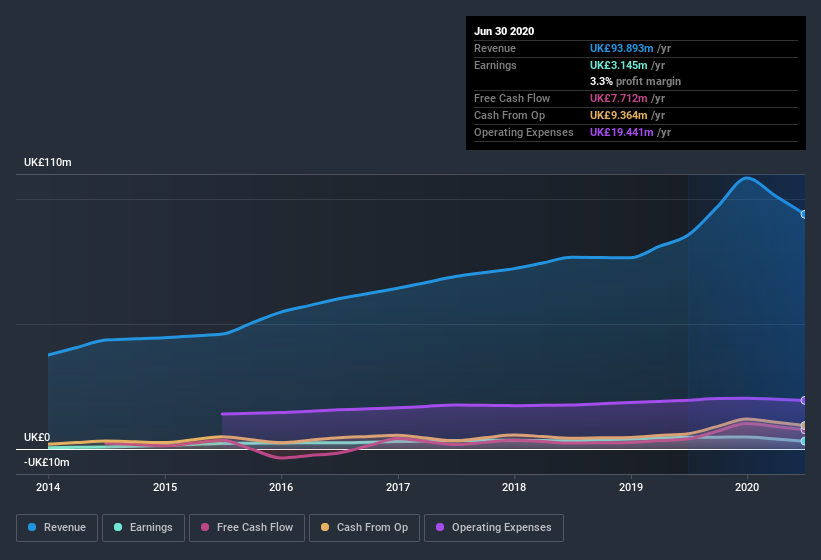- United Kingdom
- /
- Construction
- /
- AIM:BILN
Here's Why Billington Holdings's (LON:BILN) Statutory Earnings Are Arguably Too Conservative

Broadly speaking, profitable businesses are less risky than unprofitable ones. Having said that, sometimes statutory profit levels are not a good guide to ongoing profitability, because some short term one-off factor has impacted profit levels. This article will consider whether Billington Holdings' (LON:BILN) statutory profits are a good guide to its underlying earnings.
While Billington Holdings was able to generate revenue of UK£93.9m in the last twelve months, we think its profit result of UK£3.15m was more important. The chart below shows how it has grown revenue over the last three years, but that profit has declined.
Check out our latest analysis for Billington Holdings

Of course, it is only sensible to look beyond the statutory profits and question how well those numbers represent the sustainable earnings power of the business. Today, we'll discuss Billington Holdings' free cashflow relative to its earnings, and consider what that tells us about the company. Note: we always recommend investors check balance sheet strength. Click here to be taken to our balance sheet analysis of Billington Holdings.
Examining Cashflow Against Billington Holdings' Earnings
In high finance, the key ratio used to measure how well a company converts reported profits into free cash flow (FCF) is the accrual ratio (from cashflow). The accrual ratio subtracts the FCF from the profit for a given period, and divides the result by the average operating assets of the company over that time. This ratio tells us how much of a company's profit is not backed by free cashflow.
That means a negative accrual ratio is a good thing, because it shows that the company is bringing in more free cash flow than its profit would suggest. While it's not a problem to have a positive accrual ratio, indicating a certain level of non-cash profits, a high accrual ratio is arguably a bad thing, because it indicates paper profits are not matched by cash flow. To quote a 2014 paper by Lewellen and Resutek, "firms with higher accruals tend to be less profitable in the future".
For the year to June 2020, Billington Holdings had an accrual ratio of -0.32. That implies it has very good cash conversion, and that its earnings in the last year actually significantly understate its free cash flow. To wit, it produced free cash flow of UK£7.7m during the period, dwarfing its reported profit of UK£3.15m. Billington Holdings shareholders are no doubt pleased that free cash flow improved over the last twelve months.
Our Take On Billington Holdings' Profit Performance
Happily for shareholders, Billington Holdings produced plenty of free cash flow to back up its statutory profit numbers. Because of this, we think Billington Holdings' underlying earnings potential is as good as, or possibly even better, than the statutory profit makes it seem! On the other hand, its EPS actually shrunk in the last twelve months. The goal of this article has been to assess how well we can rely on the statutory earnings to reflect the company's potential, but there is plenty more to consider. If you want to do dive deeper into Billington Holdings, you'd also look into what risks it is currently facing. Every company has risks, and we've spotted 2 warning signs for Billington Holdings you should know about.
This note has only looked at a single factor that sheds light on the nature of Billington Holdings' profit. But there is always more to discover if you are capable of focussing your mind on minutiae. For example, many people consider a high return on equity as an indication of favorable business economics, while others like to 'follow the money' and search out stocks that insiders are buying. So you may wish to see this free collection of companies boasting high return on equity, or this list of stocks that insiders are buying.
If you decide to trade Billington Holdings, use the lowest-cost* platform that is rated #1 Overall by Barron’s, Interactive Brokers. Trade stocks, options, futures, forex, bonds and funds on 135 markets, all from a single integrated account. Promoted
Valuation is complex, but we're here to simplify it.
Discover if Billington Holdings might be undervalued or overvalued with our detailed analysis, featuring fair value estimates, potential risks, dividends, insider trades, and its financial condition.
Access Free AnalysisThis article by Simply Wall St is general in nature. It does not constitute a recommendation to buy or sell any stock, and does not take account of your objectives, or your financial situation. We aim to bring you long-term focused analysis driven by fundamental data. Note that our analysis may not factor in the latest price-sensitive company announcements or qualitative material. Simply Wall St has no position in any stocks mentioned.
*Interactive Brokers Rated Lowest Cost Broker by StockBrokers.com Annual Online Review 2020
Have feedback on this article? Concerned about the content? Get in touch with us directly. Alternatively, email editorial-team@simplywallst.com.
About AIM:BILN
Billington Holdings
Through its subsidiaries, provides structural steel and construction safety solutions in the United Kingdom and Europe.
Flawless balance sheet established dividend payer.
Market Insights
Community Narratives



